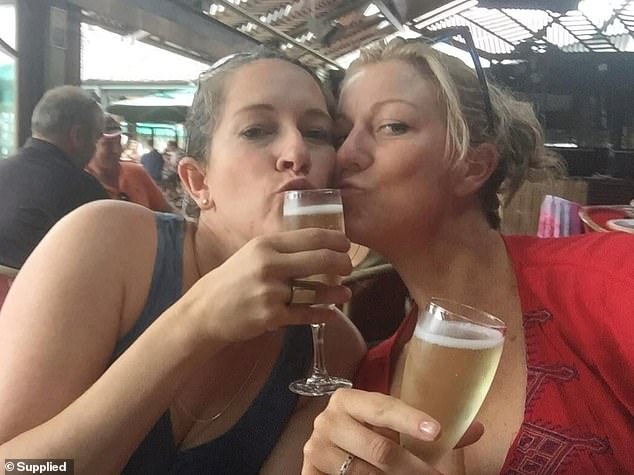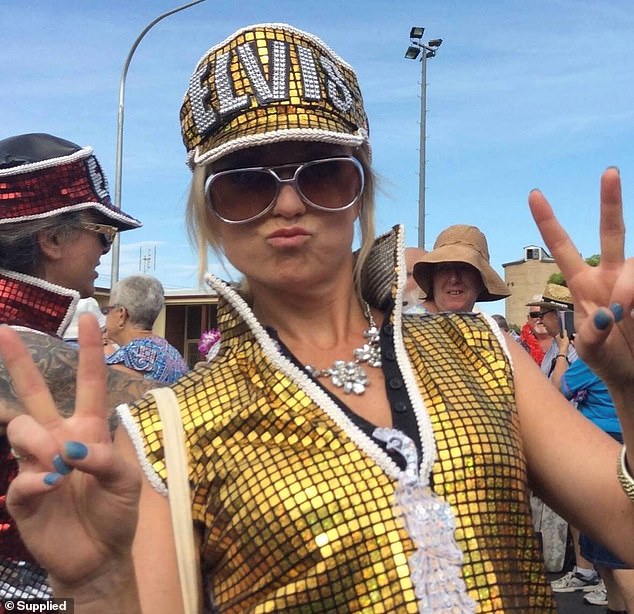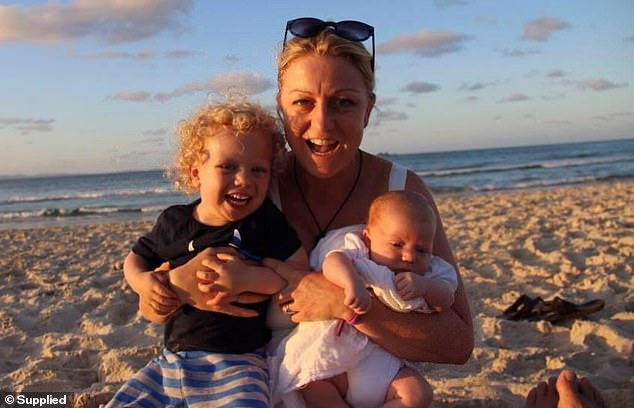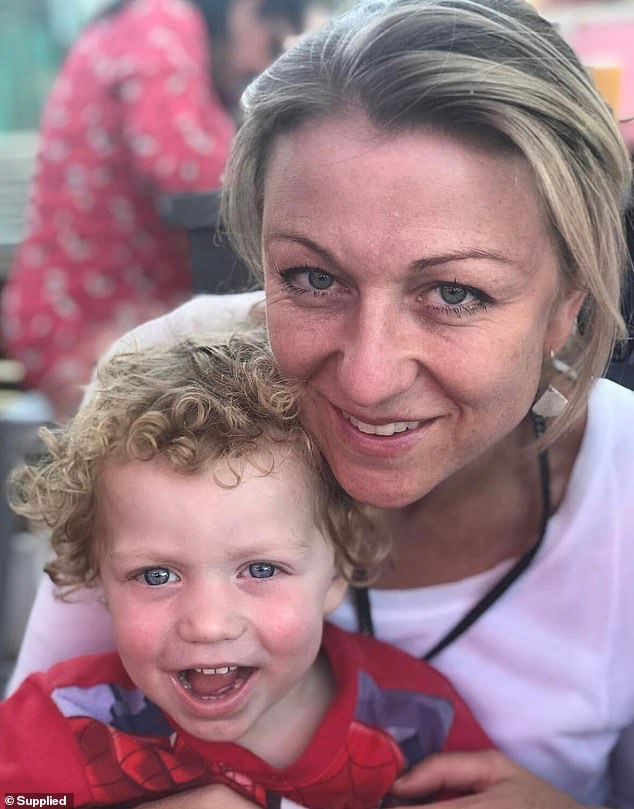Waking up in the morning, Kim Raysmith’s head was thumping and her eyes were bloodshot.
As she shuffled to the kitchen, she discovered two empty wine bottles on the counter.
While Kim, from Perth, didn’t remember drinking them, she knew deep down she had.
Because despite being a mother to a baby and a toddler, it was the same story every night: a vicious cycle she couldn’t seem to break.
It had been this way since she was a teenager, when she drank to come out of her shell. It made her a fun ‘party person’.
‘Alcohol unleashed my extroverted side and gave me a confidence boost,’ Kim, now 49, tells me.
‘If I had a drink in my hand, I could connect with anyone, which I loved and thought was fantastic. It let out the fun side of me – but I didn’t know it was addictive.’
Growing up in the 1980s, Kim was surrounded by alcohol, and drinking daily was ‘the norm’.

‘Alcohol unleashed my extroverted side and gave me a confidence boost,’ Kim, now 49, tells me. Growing up in the 1980s, Kim, right, was surrounded by alcohol and drinking daily was normal
She smoked her first cigarette at age ten and stole from her parents’ liquor cabinet at 14 – then refilled the bottle with water to make it seem like nothing had been taken.
‘I started working at a pub at 15, serving tables, and was always around alcohol, with easy access to it. When I turned 18, I started working behind the bar,’ she adds.
As her drinking escalated, Kim was also struggling with an eating disorder.
‘I couldn’t control my food. I was drinking a lot but thought it wasn’t a big deal because everyone was drinking,’ she says.
‘For me, it was a trifecta: I couldn’t control my drinking, smoking and food.’
At 21, Kim and her best friend decided to travel overseas.
‘We travelled to let loose, bar-hopped around the world and I didn’t want to come home,’ she explains.
‘We climbed the Himalayas, hitchhiked around Europe, worked on the Greek islands, lived in India for six months, and crashed a Bon Jovi music video in America.’
But soon after landing in the U.S., Kim’s eating disorder worsened. She returned home, where she sought help from a psychologist. But as soon as she got that under control, her drinking skyrocketed.

When Kim became a mother, she vowed to control her bad behaviour, but didn’t know how

Since she was a teenager, Kim Raysmith had been living in a vicious cycle of shame and guilt while unable to stop drinking – and her husband didn’t know for years
She didn’t have a drink of choice – anything would do. Beer, wine, champagne, spirits – anything that would give her that feeling of escape and make it easier to connect with people.
When Kim met her now-husband Ben, she found she was able to control her drinking in front of him, but would get blind drunk on nights out with friends.
Even after the couple moved to Canberra together, Kim would drink wine while Ben was still at work, then open a fresh bottle to share when he got home so he never really knew how much she was consuming.
The birth of the couple’s first child coincided with what some now call ‘mummy wine culture’ – where mothers normalise regular drinking as a way to cope with the daily struggles of parenting.
Kim describes it as ‘the perfect storm’.
Soon, her alcohol consumption went way beyond the wine she’d sip with other frazzled mums.
Kim was consuming at least a bottle of wine a night – more on weekends – and hiding it from her husband.
‘It was so easy to start drinking earlier and earlier,’ she says.
Then baby number two came along and the wheels fell off.
Kim was determined to breastfeed, so pumped often and timed feeds around her drinking.
One evening, after pumping, feeding her son, then drinking wine, she fell asleep with him in her arms.
She ended up dropping him.
Kim didn’t realise what she’d done until her husband told her the next morning.
‘It was so traumatic [when he told me] that I went into shock. Ben walked out and was just disgusted with me,’ she admits.
‘I got up and was so ashamed that I drank a bottle of wine. But I told myself, “This is the last bottle I’ll ever have”.’
After that, Kim went to counselling and managed to stop drinking for four months. But then she started again, and soon she was back to where she’d started.
By then, she knew she wanted to stop, but controlling her drinking felt impossible.
‘Working and exercising are wonderful ways to keep control. But when you become a mother, you’re at home all the time – you can go to the bottle shop at any point and no one will know,’ she says.
‘The drinking got so bad that I started to buy small bottles of vodka because you couldn’t smell it and put them in my handbag to have on-the-go while at the shops.
‘When I’d walk around with the pram and the small bottle in my bag, I wouldn’t feel like half a person, I’d feel like a quarter of a person. I felt quite disassociated with life because I couldn’t control this thing.’
At the time, Ben worked as a sports physiotherapist for athletes across Australia and was away for weeks at a time – he even attended the Olympics.
‘He was at the top of elite-level sports and I was struggling at home with alcohol, and he had no idea,’ Kim says.
‘Every time he would leave, I would drive him to the airport and cry the whole way home – not because I missed him, because I knew I couldn’t control my thoughts that were going to say, “You have to go to the bottle shop.”
‘I was scared and felt like an alien. I felt like there was something incredibly wrong with me.’
At that time, in 2016, sobriety coaches weren’t a thing, and there weren’t many books out there about how to quit drinking.
So Kim returned to the doctor, who prescribed Naltrexone, a drug that reduces excessive drinking by blocking the brain receptors that make alcohol pleasurable.
Yet thinking she’d have ‘one last hurrah’, Kim took the drug and then downed a bottle of vodka.
‘I had a complete blackout, gave myself alcohol poisoning and vomited in bed for two days,’ she says.
It was her rock bottom.
Desperate for help, Kim called her mum and said, ‘I can’t believe I did this’.
‘She just said: “Go to Alcoholics Anonymous – you have to go.” To be honest, I felt like there was no other option,’ Kim says.
‘Going to AA was like a prison sentence to me. In my mind, I didn’t belong there. I walked in on my own one winter morning and just started crying. Someone put their arms around me and took me to get a coffee.
‘I was so afraid others would discover I was going to AA.’

It wasn’t until she came across the podcast and book This Naked Mind by Annie Grace that Kim found ‘the missing piece’ of the puzzle
While Kim worked the program for the next 18 months, she still struggled to stay sober and had what she describes as an ‘on-and-off relationship with alcohol’.
It wasn’t until she came across the podcast and book This Naked Mind by Annie Grace that everything changed.
‘I finally understood the science of addiction and the mind,’ she tells me.
‘It was like the gates of heaven opened. I cried listening to it. I had lived in shame my whole life and thought, “Where has this been all this time?” I learnt it wasn’t me. It was the substance.’
Kim describes it as the ‘missing piece of the puzzle’ and, with this knowledge, was finally able to stop drinking for good.
Today, she has been sober for eight years.
She is now a sobriety coach, hosting retreats, events, and yoga and breathwork classes to help others control their drinking.
‘Nothing can beat living life sober. It is the greatest joy and my biggest success,’ she says.
‘Every day, I am free. I do so much, as if I’m making up for lost time. I want to be busy and now I have so much energy that I never had before.
‘My mission in life is to help other people because I don’t ever want anyone to take as long as it did for me.’
For more information, click here.












